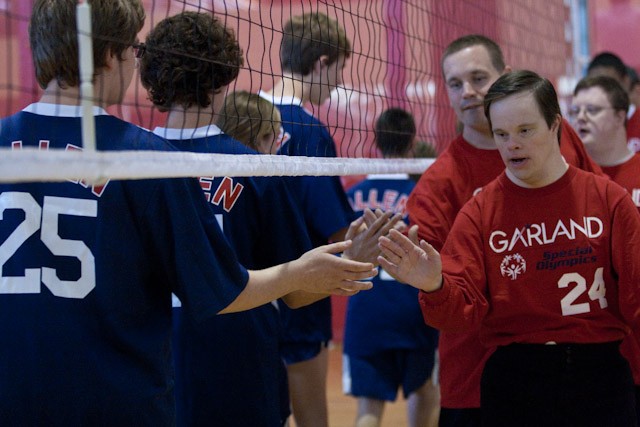
(REBECCA HANNA/The Daily Campus )
Over 250 Special Olympics Texas volleyball players and hundreds of volunteers packed into SMU’s Dedman Center Saturday for the SMU Interfraternity Council (IFC)-hosted volleyball tournament. The event, which ran from 8 a.m. to 5 p.m., was open to the public and welcomed students and parents.
The IFC provided three courts for the athletes to compete, as well as meals, refreshments, t-shirts and volunteers from SMU fraternities. Fraternity members helped to keep score of each set, judge the lines on the court and hold awards ceremonies.
This is the 12th year that the IFC has welcomed the Special Olympics Texas to play at SMU. The players come from 18 counties in the Greater Dallas Area (Area 10) to compete in the annual competition.
Cyndi Murchison, director of Special Olympics for Area 10, is grateful for IFC’s service.
“IFC has taken on all of the sponsorships,” she said. “Several of them even showed up and were singing to the athletes outside. It was adorable.”
Every year, hundreds of athletes, volunteers and coaches sign up for the Special Olympics Volleyball tournament on the Special Olympics Texas website. Once registered, the Special Olympics employees direct athletes and coaches to the program director for their respective counties, so they can join the team in their division.
The teams are determined by the skill level of athletes. Traditional volleyball teams involve only athletes with intellectual disabilities. Unified teams, on the other hand, include “partners,” who are players without disabilities and help the players with disabilities.
Most of the teams have practices and weekly play, which are similar to weekly scrimmages over the course of the year. The tournament at SMU is where the players put their skills to the test.
While the competition serves as a way for the athletes to stay fit, it also provides them with a social experience that they might otherwise not have.
“For most of these athletes, it’s their only time to compete in volleyball. It’s a huge deal for them,” Murchison said. “And they really enjoy SMU; they really look forward to it every year.”
Alex Mace, a member of the Sigma Phi Epsilon fraternity, is amazed at how well the players performed.
“It’s kind of inspiring,” he said. “A lot of those guys are doing really impressive stuff.”
Bradley Rossef, who plays for the Richardson team, said that the volleyball tournament serves as an escape. When he is not working at Super Target, he is coaching basketball and softball and playing volleyball.
“I like that it’s exercise and that I get out of the house. And I love sports,” he said.
Holding the silver medal that he earned after the Richardson team beat the Special Delivery team, Ian Rawn nods his head in agreement with Rossef.
“I love the people, I love the staff and I love to play sports,” he said. “Volleyball especially.”
Rawn has played for the Special Olympics since he was a child in Little Rock, Ark. He joined the Area 10 Special Olympics in 2003.
While most of the teams recruit all of their teammates to play in the tournament, some still struggle to get all of their players involved. Cozea Stephens, the head of the Bachman Therapeutic Recreation Center delegation, said that his team has 18 players, but only 11 showed up to play for the tournament.
“We’re just trying to scoop the remaining seven people to come out and compete because that’s what we want them to do—we want them to come out and meet people,” he said. “This is their social ground, and we really want them to experience it.”
The winning teams from Saturday’s tournament will compete in Austin next February.








